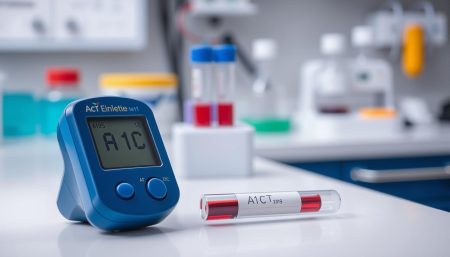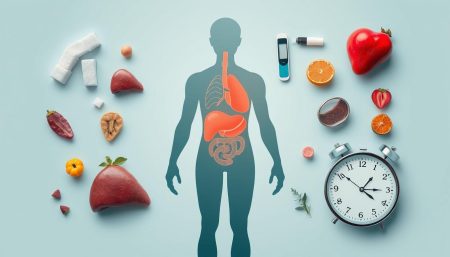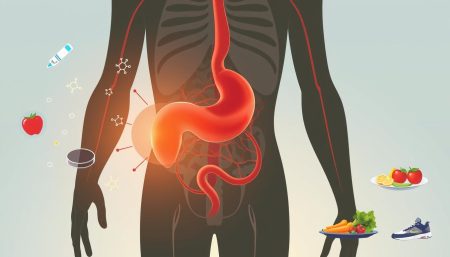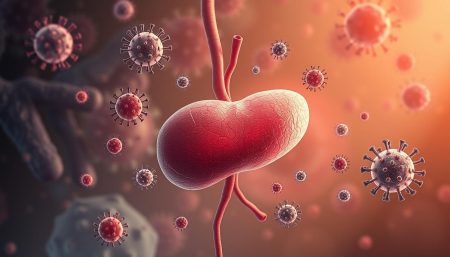Understanding the different types of diabetes is key to good care and management. This article will show you the main differences between diabetes insipidus and diabetes mellitus. These two conditions may sound similar, but they have different diabetes causes, diabetes symptoms, and treatment plans.
We aim to help you understand these differences well. This knowledge is important for accurate diagnosis and effective treatment. It’s a step towards better health and outcomes for those affected.
Let’s explore the details of both conditions together. We’ll start with an overview and then dive into the specific characteristics of each. This approach is essential for a deep and practical discussion.
By focusing closely on these differences, we help both patients and healthcare providers. This way, we all work towards better health and control over diabetes.
Understanding Diabetes: A Brief Overview
Diabetes is a complex group of metabolic disorders. It is mainly marked by high blood glucose levels. These levels can be dangerous if not controlled well. This condition affects many people worldwide, making it a big health issue.
The core issue with diabetes is how the body handles insulin. Insulin is key for glucose to get into cells and be used for energy. When this system fails, blood sugar levels stay high. This can harm the heart, kidneys, eyes, and nerves.
Each type of diabetes has its own causes and treatments. This makes comparing them important for better management and prevention of complications.
- Type 1 Diabetes: Often diagnosed in children and young adults, where the body does not produce insulin.
- Type 2 Diabetes: More prevalent type where the body fails to use insulin properly and gradually loses the capacity to produce enough insulin in the pancreas.
- Gestational Diabetes: Develops during pregnancy and may resolve after giving birth, though it raises the risk of type 2 diabetes later in life.
Knowing about these types is key to managing and preventing serious problems. The fact that millions suffer from diabetes worldwide shows we need to understand and compare them well to fight this disease.
Diabetes Insipidus vs Diabetes Mellitus: Defining The Conditions
Understanding diabetes is key. This part explains the main differences between Diabetes Insipidus and Diabetes Mellitus. These two conditions are often mixed up because they share a similar name.
What Is Diabetes Insipidus?
Diabetes Insipidus is a rare condition that affects how the body handles water. It happens when the body can’t make enough antidiuretic hormone (ADH). This hormone helps control how much water is in the blood. Without enough ADH, the kidneys remove too much water, causing a lot of urine.
What Is Diabetes Mellitus?
Diabetes Mellitus deals with blood sugar and insulin. It includes types like Type 1 and Type 2. These types happen when the body can’t make or use insulin well.
| Feature | Diabetes Insipidus | Diabetes Mellitus |
|---|---|---|
| Primary Concern | Water balance in the body | Glucose regulation in blood |
| Hormone Involved | Antidiuretic hormone (ADH) | Insulin |
| Typical Symptom | Excessive urination | High blood sugar levels |
| Key Diabetes Causes | ADH deficiency | Insulin resistance or deficiency |
This comparison shows why it’s important to tell Diabetes Insipidus and Diabetes Mellitus apart. Understanding these differences helps in finding the right treatment. It also sheds light on the different diabetes causes and how they work. This knowledge helps both patients and doctors find better ways to manage the condition.
The Underlying Causes of Diabetes Types
Understanding the diabetes causes behind Diabetes Insipidus and Diabetes Mellitus is key. It helps us see how different they are in treatment and management. We’ll look at genetic, autoimmune, and lifestyle factors that lead to these conditions. We’ll also see how they affect different organs and our health.
Diabetes Insipidus mainly affects the kidneys’ ability to hold water. On the other hand, Diabetes Mellitus impacts the pancreas and insulin production. Here’s a comparison to help you understand their diabetes causes better.
| Type of Diabetes | Primary Organ Affected | Primary Cause |
|---|---|---|
| Diabetes Insipidus | Kidneys | Damage to the kidneys or a hormonal imbalance often related to the pituitary gland. |
| Diabetes Mellitus | Pancreas | Insulin resistance or deficiency, often associated with genetic predispositions and lifestyle factors. |
The diabetes comparison shows the differences in causes and the organs affected. This leads to unique symptoms and treatment plans for each. Genetics play a big role in both, but lifestyle choices like diet and exercise also impact Diabetes Mellitus.
This look into diabetes highlights the need for personalized healthcare. It also shows the importance of more research into diabetes causes. This way, we can develop better prevention and management strategies for each type.
Symptoms: Recognizing Diabetes Insipidus and Mellitus
It’s important to know the symptoms of diabetes early. This helps in getting the right treatment quickly. We will look at the signs of diabetes insipidus and mellitus. Knowing these symptoms can help you get medical help fast.
Identifying Symptoms of Diabetes Insipidus
Diabetes insipidus is known for making you urinate a lot. You might also feel very thirsty and drink a lot of water. This can make it hard to sleep and do daily things because you have to go to the bathroom so often.
Common Symptoms of Diabetes Mellitus
Diabetes mellitus shows up in different ways. You might feel thirsty more often, need to go to the bathroom a lot, and have high blood sugar. You could also feel tired, see things less clearly, and have wounds that don’t heal fast. These signs mean your body can’t handle sugar right, so you need to see a doctor.
Comparing the symptoms of diabetes insipidus and mellitus can help in distinguishing between these two distinct types of diabetes at the initial stages. Below is a detailed comparison:
| Symptom | Diabetes Insipidus | Diabetes Mellitus |
|---|---|---|
| Excessive Urination | Very high volume, dilute | High volume |
| Increased Thirst | Extreme | High |
| Blood Sugar Levels | Normal | High |
| Weight Impact | Potentially stable | Loss or gain |
Diagnosis Procedures for Diabetes
Getting an accurate diabetes diagnosis is key for managing and treating the disease. Different diabetes types need specific tests to confirm their presence. These tests help understand how the disease affects a person’s health.
Healthcare professionals use various tools to diagnose both diabetes insipidus and diabetes mellitus. Each tool is important for confirming the disease type and stage. This information is vital for creating a treatment plan that fits the patient’s needs.
| Test | Diabetes Insipidus | Diabetes Mellitus |
|---|---|---|
| Water Deprivation Test | Used to detect the kidney’s ability to concentrate urine | Not applicable |
| Blood Sugar Monitoring | Not regularly used | Essential for daily management |
| A1C Test | Not relevant | Measures average blood sugar levels over past 3 months |
Understanding test results is critical for early detection and management of diabetes. Acting quickly based on these results can greatly improve a patient’s life and health in the long run.
Diving Into Diabetes Comparison: Insipidus vs Mellitus
It’s key to know the differences between diabetes insipidus and mellitus for the right treatment. We’ll look at the diabetes comparison and how each affects a person’s life.
Diabetes insipidus mainly deals with how much urine you make. If not treated, it can cause dehydration. On the other hand, diabetes mellitus affects how your body uses glucose. If not controlled, it can lead to serious health problems.
| Aspect | Diabetes Insipidus | Diabetes Mellitus |
|---|---|---|
| Cause | Lack of antidiuretic hormone production or kidney response | Impaired insulin production or function |
| Symptoms | Excessive urination, thirst | High blood sugar, fatigue, frequent urination |
| Treatment | Hormone replacement therapy and hydration | Diet control, medication, insulin therapy |
| Impact on Life | Managed adequately with proper hydration | Requires continuous monitoring and lifestyle adjustment |
This diabetes comparison shows why it’s vital to know the symptoms and treatments for each. Getting the right diagnosis can greatly improve a patient’s life. It means doctors can give treatments that really work for each type of diabetes.
- Patients with diabetes insipidus usually seek treatment for dehydration.
- Patients with diabetes mellitus often manage their condition through a combination of diet, exercise, and medication.
Knowing these differences is not just for patients. It’s also for doctors to give the best care for each type of diabetes.
Risk Factors: Predisposition to Diabetes Insipidus and Mellitus
It’s important to know the risk factors for different diabetes types. This knowledge helps in preventing and managing these conditions. Demographic, hereditary, and environmental factors greatly affect the occurrence of diabetes insipidus and diabetes mellitus.
Diabetes causes include genetic and lifestyle factors. Environmental influences also play a big role. We will look at key risk factors for each type of diabetes.
- Genetic Predisposition: Family history is a big factor, mainly for diabetes mellitus types 1 and 2.
- Age: Older age raises the risk of diabetes mellitus. Diabetes insipidus can happen at any age but is often found in middle-aged people.
- Autoimmune Diseases: Autoimmune conditions like Hashimoto’s thyroiditis increase the risk of type 1 diabetes.
- Lifestyle Factors: A bad diet, not enough exercise, and obesity are big risks for type 2 diabetes.
- Geographical Location: Places with less sun exposure can lead to vitamin D deficiency. This indirectly raises diabetes risk.
Understanding these risk factors for diabetes types highlights the need for specific prevention strategies. These strategies should address both general and specific factors for each diabetes type.
Treatment Options for Diabetes Insipidus and Mellitus
Looking into diabetes treatment shows us many ways to manage diabetes insipidus and mellitus. We’ll explore the key therapies and medicines used in diabetes management.
Managing Diabetes Insipidus
Diabetes insipidus needs hormone replacement therapy because of a lack of antidiuretic hormone (ADH). Desmopressin, an ADH mimic, is the main treatment. It comes in nasal spray, oral tablet, or injectable forms.
It’s also important to watch electrolyte levels and make sure patients stay hydrated.
Treating Diabetes Mellitus
Diabetes mellitus treatment involves more options. The goal is to keep blood sugar levels normal. Patients might get insulin or oral medicines based on their needs.
Changing diet and exercising regularly are also key. These lifestyle changes help control blood sugar.
| Treatment | Diabetes Insipidus | Diabetes Mellitus |
|---|---|---|
| Medication | Desmopressin | Insulin, Metformin |
| Lifestyle Changes | Adequate hydration | Diet, Exercise |
| Additional Therapies | Electrolyte monitoring | Blood glucose monitoring |

Diabetes Management: Living with Diabetes
Managing diabetes well means making lifestyle changes, watching for symptoms, and following treatment plans. This approach can greatly improve life quality and lower the risk of serious problems.
Lifestyle Changes for Diabetes Control
For people with diabetes, a healthy lifestyle is key. This includes eating right, staying active, and avoiding harmful habits like smoking and too much alcohol. Exercise helps keep blood sugar in check and boosts health.
Eating the right foods is also critical. Focus on foods that are low in sugar and rich in nutrients. These can help control blood sugar and support overall health.
Monitoring and Medication Adherence
It’s important to keep an eye on blood sugar levels. This helps adjust diet and insulin doses and catches any symptom changes early. Diabetes symptoms can vary, so regular checks are key.
Sticking to medication is also vital. The right treatment is essential for managing diabetes. Regular doctor visits help make sure treatment plans are up to date, preventing serious health issues.
Effective diabetes management is about self-care and working with doctors. It lets people with diabetes live full, active lives. By following these strategies, individuals can manage their diabetes, not the other way around.
Preventing Complications: Diabetes Insipidus and Mellitus
Effective diabetes management and advanced diabetes treatment are key to avoiding serious problems from diabetes insipidus and mellitus. Taking a proactive treatment approach can greatly lower the risk of health issues now and in the future.
Keeping diabetes under control means regular checks, making lifestyle changes, and sometimes taking medicine. It’s important for patients to know their role in managing their diabetes to avoid serious problems.
- Regular Monitoring: It’s important for diabetes mellitus patients to check their blood sugar often. For those with diabetes insipidus, keeping track of water intake and output is essential.
- Medication Adherence: Taking all medicines as directed is vital for managing symptoms and preventing complications.
- Lifestyle Modifications: Eating right and staying active can help keep blood sugar levels stable and support overall health.
Working closely with healthcare providers is important for creating a diabetes treatment plan that meets individual needs. Learning about both diseases helps patients manage their health well, avoiding emergencies or disease progression.
This approach to managing the disease improves life quality and reduces the risk of complications from both types of diabetes. It helps patients live healthier, more controlled lives.
Scientific Advancements: Future Outlook on Diabetes
The world of diabetes research is buzzing with new discoveries. These advancements aim to better understand and manage diabetes types. The next years will see big leaps in diabetes treatment and how we approach it.
Researchers are working hard to improve patient care and make managing diabetes easier. This will lead to a more unified way of dealing with diabetes comparison. It will change how we monitor and treat different types of diabetes.
New medicines and technologies are opening up new ways to manage diabetes. We’re talking about ultra-long-acting insulins and devices that track blood sugar and give insulin when needed. This means we can tailor treatments to fit each person’s needs better than ever before.
- Enhanced insulin delivery systems
- Real-time glucose monitoring devices
- Advanced dietary supplements and medications
Diabetes treatment and how we diagnose it are changing fast. This shows we need to manage diabetes in a way that fits each person’s unique situation.
| Year | Advancement | Impact on Diabetes Treatment |
|---|---|---|
| 2021 | Introduction of extended-release insulin | Enhances control over glucose levels, reducing daily dosing frequency |
| 2022 | Launch of non-invasive glucose monitoring patch | Improves patient compliance and monitoring accuracy |
| 2023 | Development of AI-driven dietary recommendations | Personalizes diet plans to optimize glycemic control based on real-time data |
Looking ahead, research and sharing data worldwide will be key. This will help create simpler ways to manage diabetes types. The use of AI and machine learning in diabetes care is very promising. It could lead to new ways to prevent and treat diabetes, setting a new standard in diabetes comparison and care.
The Role of Diet and Nutrition in Diabetes Maintenance
Diet plays a big role in managing diabetes. It affects how well you can control your blood sugar. What you eat can help or hurt your diabetes symptoms.
Knowing what to eat is key to managing diabetes well. You need the right mix of nutrients to keep your blood sugar stable. This helps avoid big ups and downs in your blood sugar levels.

Eating foods high in fiber, lean proteins, and healthy fats helps. These foods slow down how quickly your body absorbs glucose. This is important for keeping your blood sugar steady.
It’s also important to cut down on foods that raise your blood sugar too fast. These are called high glycemic index foods.
- Whole grains like quinoa and steel-cut oats
- Leafy greens such as spinach and kale
- Protein sources like chicken breast and lentils
- Healthy fats found in avocados and almonds
Getting a diet plan that’s just right for you is often a good idea. Everyone’s health needs are different. Knowing about natural remedies and treatment plans for related health issues can also help.
| Food Item | Benefits for Diabetes |
|---|---|
| Quinoa | High in protein and fiber, low glycemic index |
| Spinach | Rich in iron and low in carbs, helps in blood glucose regulation |
| Chicken Breast | Lean protein that aids in muscle repair and blood sugar stabilization |
| Almonds | Healthy fats and magnesium, beneficial for heart health and blood sugar control |
Seeing a nutritionist and checking your blood sugar often are key. With the right diet and treatment, you can manage your diabetes better. This can lead to a healthier life.
Patient Stories: Real Experiences with Diabetes Insipidus and Mellitus
Personal stories reveal the depth of living with diabetes, whether it’s insipidus or mellitus. Each person’s journey with diabetes is unique and inspiring. These stories show resilience and daily commitment.
For example, someone with diabetes mellitus type 1 needs insulin every day. They count carbs, check blood sugar often, and stay active. Their story highlights the mental strength needed for this life-long routine.
Another person deals with diabetes insipidus, a rare condition. They must carefully manage fluid and electrolytes. Their story shows the importance of precision in treatment.
Together, these stories highlight the need for education and support in diabetes care. They show that managing diabetes is possible, leading to a full life. Hearing these stories, we see the power of overcoming diabetes challenges.
FAQ
Q: What are the main differences between diabetes insipidus and diabetes mellitus?
A: Diabetes insipidus is a rare disorder that affects how the body handles water. It causes intense thirst and heavy urination. It’s caused by problems with a hormone called antidiuretic hormone (ADH).
Diabetes mellitus, on the other hand, is a common metabolic condition. It’s caused by high blood sugar levels due to insulin issues.
Q: How prevalent is diabetes globally?
A: Diabetes is a big health problem worldwide. It’s getting more common, with millions of people living with it. Type 2 diabetes mellitus is the most common type.
Q: Can both diabetes insipidus and diabetes mellitus occur in the same person?
A: It’s rare, but yes, someone can have both conditions. They are different disorders with different causes. But it would be by chance, not because of a shared cause.
Q: What are the specific symptoms that help distinguish diabetes insipidus from diabetes mellitus?
A: Diabetes insipidus symptoms include extreme thirst and a lot of very dilute urine. Diabetes mellitus symptoms also include thirst, but also fatigue, weight loss, and blurred vision.
Other symptoms of diabetes mellitus include slow healing of wounds and frequent infections. High blood sugar levels are a key sign.
Q: Are the diagnostic procedures for diabetes insipidus and mellitus similar?
A: No, the tests for these conditions are different. For diabetes insipidus, a water deprivation test and ADH blood tests are used. An MRI checks the hypothalamus and pituitary gland.
Diabetes mellitus is diagnosed with blood glucose tests, glycated hemoglobin (A1C) tests, and oral glucose tolerance tests.
Q: What are the risk factors associated with diabetes insipidus and mellitus?
A: Diabetes insipidus risk factors include damage to the hypothalamus or pituitary gland. This can be from surgery, infection, tumor, or head injury.
Diabetes mellitus risk factors include obesity, a sedentary lifestyle, family history, and ethnicity.
Q: How are diabetes insipidus and mellitus treated?
A: Diabetes insipidus treatment often involves hormone replacement with desmopressin. Diabetes mellitus treatment includes diet, exercise, and medications like insulin.
Regular blood sugar monitoring is also key.
Q: What lifestyle changes are recommended for individuals diagnosed with diabetes?
A: Lifestyle changes include a healthy diet and regular exercise. Maintaining a healthy weight and avoiding tobacco are also important.
Regular blood glucose monitoring and following medication plans are also essential.
Q: How can complications from diabetes be prevented?
A: Preventing complications involves controlling blood sugar, regular check-ups, and eye exams. Foot care is also important.
Managing blood pressure and cholesterol levels is vital. Following treatment plans and lifestyle changes is key.
Q: What are the latest advancements in the treatment of diabetes?
A: New advancements include better insulin delivery methods like insulin pumps. Continuous glucose monitoring systems are also being developed.
Research into beta-cell transplant and the artificial pancreas is ongoing. There are also trials for new medications and strategies.
Q: What role does nutrition play in managing diabetes?
A: Nutrition is very important in managing diabetes. A balanced diet that controls blood sugar is essential. This includes carbohydrate counting and understanding the glycemic index.
Portion control and eating foods rich in fiber with moderate fats and proteins are also important.
Q: Can you share some patient experiences with managing diabetes insipidus or mellitus?
A: Many patients manage their diabetes well with medication, lifestyle changes, and monitoring. Their stories highlight the importance of education and support.
Living with diabetes also involves mental and emotional aspects.


















